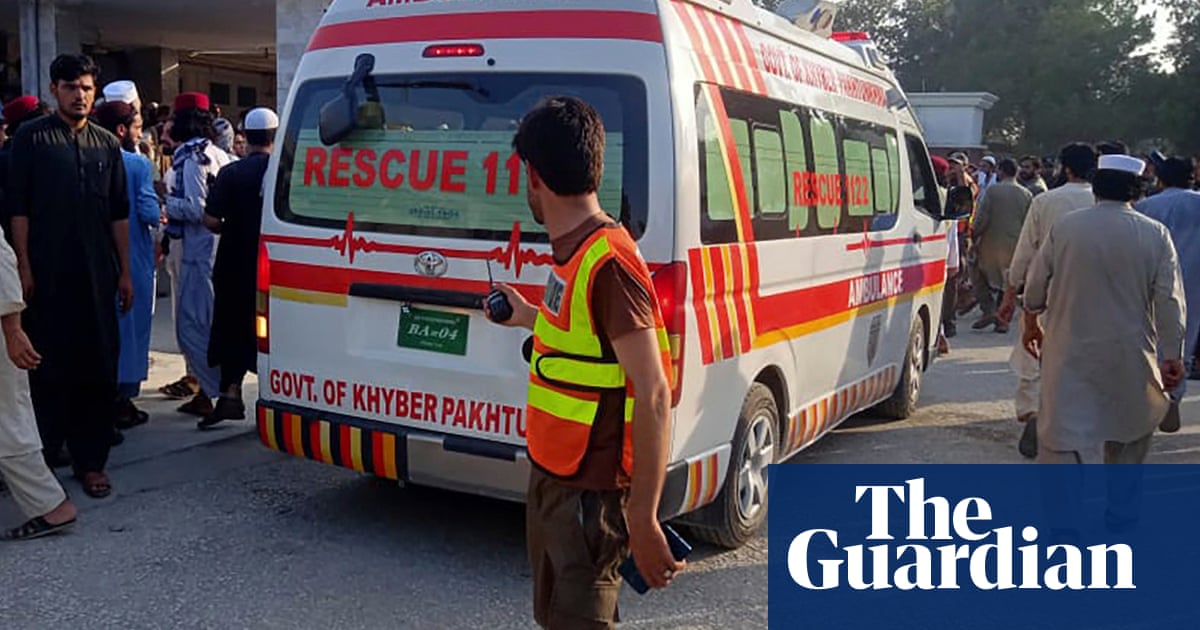
Nearly 200 injured at gathering of Jamiat Ulema-e-Islam party ahead of elections expected later this year
At least 44 people have been killed and almost 200 injured in a bomb blast in Pakistan’s north-western Khyber Pakhtunkhwa province that targeted a political party gathering.
Police said the explosion at a rally on Sunday afternoon for the conservative Jamiat Ulema-e-Islam party (JUI-F), a government coalition partner, was carried out by a suicide bomber who detonated his explosives vest close to the stage where several senior leaders of the party were sitting.
It said initial investigations suggested the Islamic State group (IS) – which operates in Afghanistan and is an enemy of the Afghan Taliban – could be behind the attack, and officers were still investigating. No group has claimed responsibility.
More than 500 supporters were gathered at a hall near a market for the rally, which was being held ahead of elections expected later this year, when the blast took place.
Footage showed ambulances arriving to transfer the injured to hospitals.
“There was dust and smoke around, and I was under some injured people from where I could hardly stand up, only to see chaos and some scattered limbs,” said Adam Khan, 45, who was knocked to the ground by the blast and hit by splinters in his leg and both hands.
Feroz Jamal, the provincial information minister, told the Associated Press that so far 44 people had been “martyred” and nearly 200 wounded in the bombing.
A health emergency was declared in the Bajaur district hospital and in adjoining areas, and some patients were moved by helicopter to Peshawar hospitals.
Officials were announcing the arrival of Abdul Rasheed, a regional party leader, when the bomb went off. Maulana Ziaullah Jan, a local leader, was killed in the blast.
Rasheed said the attack was an attempt to remove JUI-F from the field before parliamentary elections in November, but he said such tactics would not work.
The local chapter of IS has recently carried out attacks against JUI-F.
Last year, IS said it was behind violent attacks against religious scholars affiliated with the party, which has a huge network of mosques and madrassas in the north and west of the country.
The jihadist group accuses JUI-F of hypocrisy for being an Islamic group while supporting hostile governments and the military.
Political gatherings and meetings are being held across the country to mobilise supporters for the upcoming election. Pakistan’s government is due to dissolve in the next few weeks and political parties have started preparing their campaigns.
“We condemn these brutal attacks on our workers and leadership as general elections in Pakistan are approaching. The militants are creating fear and started targeting political gatherings,” said Kamran Murtaza, a JUI-F senator. “We are against this militancy and there is fear of more attacks on the political gatherings so our political party could not fully campaign for this year’s elections.”
The prime minister, Shehbaz Sharif, and president, Arif Alvi, also condemned the attack and asked officials to provide all possible assistance to the wounded and the bereaved families.
The JUI-F party is headed by the Islamist cleric Fazlur Rehman, who initiated his political career as a firebrand hardliner but who has softened his political image in recent years to make alliances with secular parties.
Bajaur is one of several remote districts bordering Afghanistan in a region known in the past for militancy. The district was a stronghold of the Pakistani Taliban – the Tehreek-e-Taliban Pakistan, known as TTP, and a close ally of Afghanistan’s Taliban government – before the Pakistani army drove them out of the area.
But the Afghan Taliban’s seizure of power in Afghanistan in mid-August 2021 has emboldened the TTP and other militants. The TTP unilaterally ended a ceasefire agreement with the Pakistani government in November, and has stepped up attacks across the country, largely targeting security officials.
In January a TTP suicide bomber blew himself up in a mosque inside a police compound in the north-western city of Peshawar, killing more than 80 officers.
The Taliban government in Afghanistan condemned Sunday’s blast in a statement by their spokesperson, Zabihullah Mujahid, while the TTP said in a statement sent to the Associated Press that the bombing was aimed at setting Islamists against each other.
Pakistan’s military says militants are operating from safe havens in Afghanistan and it has threatened to mount an “effective response” in the wake of the recent attacks.
Sunday’s bombing was one of the worst attacks in the north-west since 2014, when 147 people, mostly schoolchildren, were killed in a Taliban attack on an army-run school in Peshawar.
In March 2022, a suicide bomber struck inside another mosque in Peshawar during Friday prayers, killing at least 56 worshippers, in an attack claimed by Islamic State.
Sunday’s bombing came hours before the arrival of Chinese vice-premier He Lifeng in Islamabad, where he was to participate in an event to mark a decade of the China-Pakistan Economic Corridor, or CPEC, a sprawling package under which Beijing has invested billions of dollars in Pakistan.
In recent months, China has helped Pakistan avoid a default on sovereign payments. However, some Chinese nationals have also been targeted by militants in north-western Pakistan and elsewhere.
The Associated Press and Agence France-Presse contributed to this report